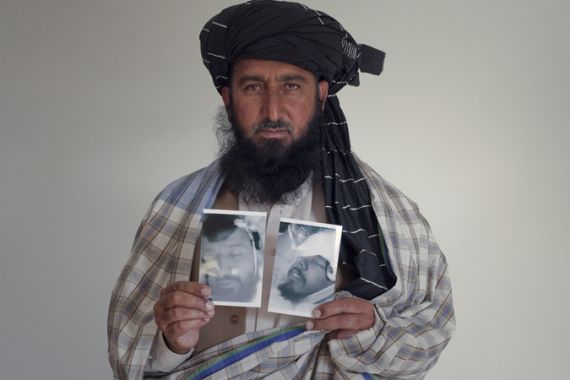Pakistan denies unmasking US spy
Country’s spy agency denies revealing identity of CIA’s Islamabad chief who’s back to US after he was named in lawsuit.

 |
| Lawyer Mirza Shahzad Akbar, right, said Kareem Khan, left, wants compensation for his dead relatives [EPA] |
Pakistan’s top spy agency has denied blowing the cover of a US spy chief in Islamabad who was forced to leave the country following death threats.
The CIA station chief was recalled after he was reportedly named in a legal complaint filed by the family of victims killed by suspected US drones.
The Inter-Services Intelligence (ISI) on Saturday denied helping to unmask the US spy, dismissing speculation it was retaliating for a US lawsuit linking Pakistan’s intelligence chief to the 2008 attacks in Mumbai, India.
An ISI official warned that such allegations risk raising tensions between the already uneasy allies.
The station chief’s name was revealed in the suit filed by Kareem Khan, a tribesman from the North Waziristan region, who sued the CIA over the deaths of his son and brother in a 2009 US missile strike.
Accusing the CIA station chief of orchestrating the missile strikes, Kareem Khan said in the suit he is seeking $500m in compensation from the US in two weeks or he will proceed with the lawsuit.
The Associated Press said the name listed in the legal complaint was not authentic, and did not publish the name because it said the station chief remains undercover, and that his name was classified.
The CIA recall comes at a time when Washington is pressing Islamabad to rid its lawless tribal regions of safe havens for militants fighting in Afghanistan, where the US is grappling with an exit strategy.
Attacks
Questions have arisen as to whether a civil lawsuit filed last month in Brooklyn in connection with the 2008 Mumbai attacks may have raised tensions with Pakistan and spurred it to retaliate.
The suit lists General Ahmed Shuja Pasha, the head of Pakistan’s ISI, as a defendant and accuses the ISI of nurturing terrorists involved in the Mumbai attacks, which left 166 people dead.
CIA air strikes from unmanned aircraft have killed Taliban and al-Qaeda leaders and fighters, but have led to accusations in Pakistan that the strikes kill innocent people.
The US does not, as a policy, acknowledge the missile strikes, but there have been more than 100 such attacks this year – more than double the amount in 2009.
The Pakistan lawsuit blew the CIA station chief’s cover, leading to threats against him and forcing the US to call him home, US officials said on condition of anonymity.
“Our station chiefs routinely encounter major risk as they work to keep America safe, and they’ve been targeted by terrorists in the past,” George Little, a CIA spokesman, said.
“They are courageous in the face of danger, and their security is obviously a top priority for the CIA, especially when there’s an imminent threat.”
Suing the agents
The lawsuit in Pakistan also named Leon Panetta, the CIA director, and Robert Gates, the US defence secretary, as defendants.
 |
| Kareem Khan in his suit accused the CIA Islamabad station chief of orchestrating the drone attacks [Reuters] |
Demonstrators in the Pakistani capital, Islamabad, have carried placards bearing the officer’s name as listed in the lawsuit and urging him to leave the country.
Shahzad Akbar, the lawyer involved in the case, said he got the station chief’s name listed in the lawsuit from Pakistani journalists. Akbar said he included the name because he wanted to sue a CIA operative living within the jurisdiction of the Islamabad court.
A Pakistani intelligence official dismissed any claims of ISI involvement in exposing the CIA official as “a slur”, saying that it was entirely possible Pakistani journalists figured out the station chief’s identity on their own.
Such “unfounded stories can create differences between the two organisations”,’ the official warned.
Earlier Al Jazeera’s Kamal Hyder, reporting from Islamabad, said the ISI slammed rumours that it was involved in the leaking of the US spy’s name.
“The intelligence agency [ISI] is also warning that such unfounded reports as they claim are likely to mar relations between the ISI and CIA,” he said.
Testy ties
The CIA’s work is unusually difficult in Pakistan, one of the US’ most important, and at times frustrating, counter-terrorism allies.
The station chief in Islamabad operates as a secret general in the US war against terrorism, running the Predator drone programme targeting enemy fighters, handling some of the CIA’s most urgent and sensitive tips and collaborating closely with the ISI.
Almost a year ago, seven CIA officers and contractors were killed when a suicide bomber attacked a CIA base in Khost, Afghanistan. Six other agency officers were wounded in the attack, one of the deadliest in CIA history.
In 1999, an Israeli newspaper revealed the identity of the station chief in Tel Aviv.
In 2001, a newspaper in Argentina printed a picture of the Buenos Aires station chief and details about him. In both instances, the CIA station chiefs were recalled to the US.